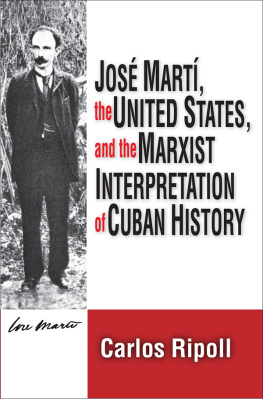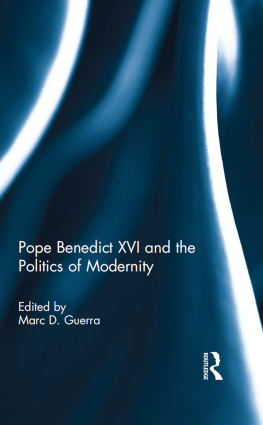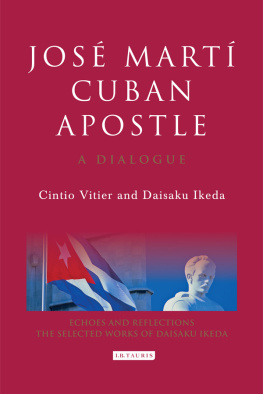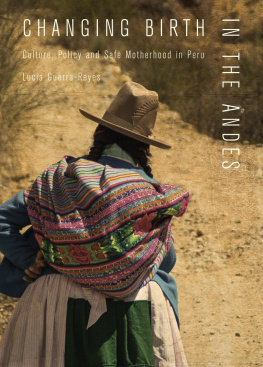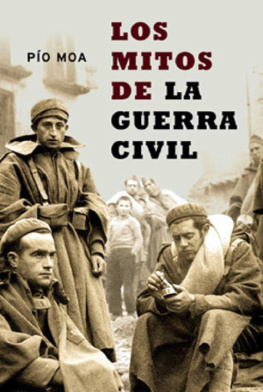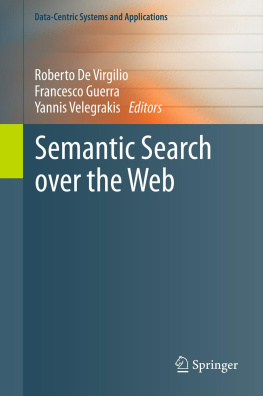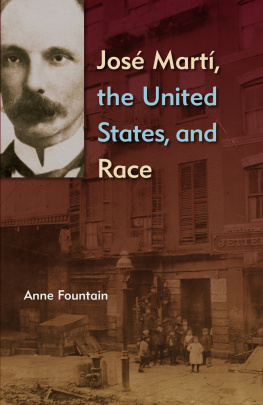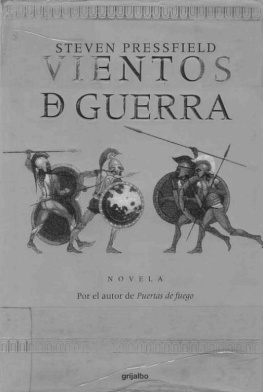2005 The University of North Carolina Press
All rights reserved
Designed by April Leidig-Higgins
Set in Minion by Copperline Book Services, Inc.
Manufactured in the United States of America
The paper in this book meets the guidelines for permanence and durability of the Committee on Production
Guidelines for Book Longevity of the Council on
Library Resources.
Library of Congress Cataloging-in-Publication Data Guerra, Lillian. The myth of Jos Mart: conflicting nationalisms in early twentieth-century Cuba /
Lillian Guerra.
p. cm. (Envisioning Cuba)
Includes bibliographical references and index.
ISBN 0-8078-2925-0 (cloth: alk. paper) ISBN 0-8078-5590-1 (pbk.: alk. paper)
eISBN : 97-8-080-78763-8
1. Mart, Jos, 1853 - 1895 Influence. 2. Nationalism Cuba History 20th century. 3. Cuba Politics and government 20th century. I. Title. II. Series. F1783.M38G78 2005 813.6 dc22 2004062098
cloth 09 08 07 06 05 5 4 3 2 1
paper 09 08 07 06 05 5 4 3 2 1
ACKNOWLEDGMENTS
THIS WORK REPRESENTS the fulfillment of a promise that I made to myself when I first seriously considered dedicating my life to the pursuit of scholarly knowledge. In the nearly two years I spent in Cuba researching the dissertation that formed the basis for this book, I came to realize that my own pursuit of history was as much personal as academic. In Cuba, I discovered a dynamic community of intellectuals who embraced me and my project, whatever their differences of interpretation and opinion. I also found over 200 relatives who opened their doors and hearts to me as if they had always known me and as if they had always expected that I would one day come back, despite the fact that I was not born in Cuba but in the United States. Technically, as one relative said to me, his eyes twinkling, that means that you never left. This book expresses the sense of love for Cuba and commitment to its sovereignty that I found not only in all the Cubans whom I met in Cuba but that I also share.
Indeed, since that first extended and unforgettable stay from 1996 to 1998, I have never really left. Going to Cuba regularly and weaving the complex halves of my life together has become the center of my being and the well of my inspiration. Given the historic and unjust divides that separate not only Cuba from the United States but also many Cubans from one another, not a day goes by that I do not recognize how privileged I am. Unlike most Cubans, who do not have the luxury to travel back and forth or see both sides of Cubas reality for themselves, the national and the imperial, I can count large, extended families as well as vibrant, intellectual communities of friends and colleagues on both sides of my own daily divide.
At a time when monies for research projects in Cuba were still hard to come by, the Institute for the Study of World Politics and a special fund for previous recipients of the Mellon Minority Academic Careers Fellowship provided funds for the fieldwork portion of this project. The University Fellowship of the University of Wisconsin-Madison and two further semesters of support from the John D. and Catherine T. MacArthur Foundation provided the funds that enabled me to focus on writing. I am grateful to all of these institutions. I am especially grateful to the Andrew W. Mellon Foundation for designating me a Mellon Minority Academic Fellow when I first fell in love with history as a college sophomore at Dartmouth. Without the many years of mentorship under Professors Doug Haynes, Ral Bueno, and Leo Spitzer that it entailed, I would never have become a scholar of Latin America or a professor of history.
I am also deeply indebted to all of my compaeros at the Instituto de Historia de Cuba, especially Amparo Hernndez Denis and Jos Cantn Navarro, whose personal warmth and endless patience with my need for advice and letters of introduction can never be fully reciprocated. In the eight years that I have worked in Cuba, the Instituto de Historia has always offered consistent and enthusiastic support for my perspective and projects. Without its support, this book would not have been possible. I am deeply indebted to the staff of the Archivo Nacional de Cuba and the dedicated Cuban historians who spent as many horas nalgas before the documents as I did. Marial Iglesias, Francisco Prez, Yolanda Daz, Gloria Garca, and others served as models for the kind of deep research I wanted to do. I also thank Niurys of the Fondo de Libros Raros at the University of Havana and the staff of the Centro de Estudios Martianos, especially Pedro Pablo Rodrguez, Maylo Pajn, Renio Daz Triana, and Ana Elena Arazoza. I also thank the archivist-historians of the Archivo Provincial de Cienfuegos Ritica Surez del Villar y Surez del Villar, especially Mitsi, Mery, and Berta as well as Orlando Garca, its director. Together, these intellectuals not only guided me through their document collections and clarified my own interpretations of them but also helped me resurrect the ghosts of my familys past.
I also want to thank the community of historians at the University of Wisconsin-Madison that prepared me for my work in Cuba and guided its fruition so steadily upon my return. For sharing what was a challenging and at times emotionally harrowing journey toward my doctoral degree, I thank the friends and colleagues who supported me along the way, especially Ileana Rodrguez Silva, Leo Garofalo, Solsire Del Moral, Joe Hall, Jean Weiss, Tom Green, Cindy Green, Ruthie Green, Ellie Green, Louise Pubols, Tracey Deutsch, David Chang, Mara Moreno, Eileen Willingham, Anne Macpherson, Nancy Appelbaum, Ren Reeves, Patrick McNamara, Bert Kreitlow, Thomas Andrews, and Andrs Matas Ortz. For having opened up the horizons of my creativity and helping me to harness its energy so consistently over the years, I am most indebted to my graduate advisers, Florencia Mallon, Francisco Scarano, and Steve J. Stern. They taught me not only how to do good history but also how to remain emotionally engaged and politically passionate about my subject, just as they are. Perhaps most important, Florencia, Franco, and Steve never stopped believing in me. Their faith in my skills, talents, and ambition has proved unwavering, even when my own has faltered.
I owe a great deal of thanks to my students at Bates, some of whom accompanied me to Cuba on different occasions, for being my community of Latin Americanists in Maine and for making my efforts to fuse a passion for teaching and a love of research worthwhile, especially Michael McCarthy, Kate Marshall, Andrea Noyes, Alexa Miller, Margherita Pilato, Nate McConarty, Bill Spirer, Galen Haggerty, Trent Lierman, Eric Stanculescu, Stephen Gresham, Patrick Quirk, Charlie Henry, and Currier Stokes. I am also grateful to my former colleagues, especially Steve Hochstadt, Liz Tobin, Dennis Grafflin, Michael Jones, John Cole, and Hilmar Jensen at Bates College for always appreciating and supporting my needs as I completed revisions and drafts of this work. I also thank Sylvia Hawks, our area coordinator for the Bates history department, whose efficiency, assistance, and optimism always proved foundational to any Cuba-related project. I am especially indebted to Lisa Maurizio, an expert on ancient Greek culture, for her advice, brilliant conversation, and suggestions on theoretical approaches for interpreting the meaning and function of myths. In addition to being a constant source of personal support, Kevin Yelvington, of the University of South Florida, has offered pivotal and well-timed advice on interdisciplinary approaches to race, identity, and Jos Mart. I am also deeply indebted to Aline Helg, who read the original version of this book as a doctoral dissertation out of no obligation other than her passionate commitment to the subject of Cubas internal political struggles and the kindness of her heart. Despite its exceedingly lengthy and rough form, Aline returned twelve single-spaced, handwritten pages of notes to me. Her notes became the initial guide for the revisions that led to the manuscript of this work. Louis A. Prez and Alejandro de la Fuente, who served as readers for the University of North Carolina Press, honored me with their critical, keenly targeted, and frank remarks at an earlier stage of the publication process. Ultimately, the need to satisfy their concerns impelled me to make this a more accessible, theoretically coherent study than it might otherwise have been. Thanks also go to Elaine Maisner whose support, interest, and steady optimism about transforming this manuscript into a book proved critical. I also thank my new colleagues at Yale, especially Stuart Schwartz and Gil Joseph, for appreciating the potential of this book.


